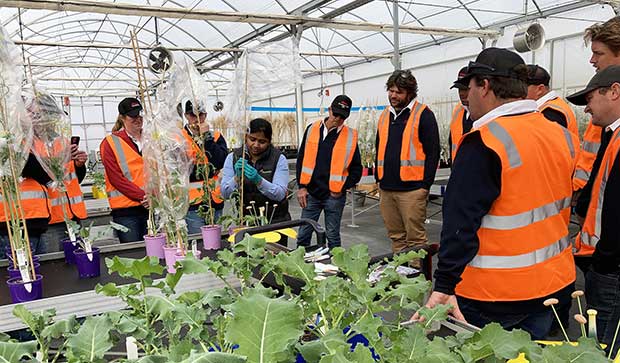Fifteen growers from the Cranbrook region of Western Australia have gained insights on hybrid canola seed production and pathways for bringing seed to market on a recent study tour to Horsham, Victoria.
The tour, held from 19 – 22 September, was arranged by Elders Cranbrook and supported by the Grains Research and Development Corporation (GRDC).
With high demand for canola seed in WA in recent seasons as well as uncertainty over the supply of seed, the study tour gave growers an in-depth understanding of the process for seed producers to bring hybrid canola seed to market, and the impact retaining seed can have on profitability.
The tour visited Nuseed and BASF’s canola seed technology sites to hear about new and pipeline hybrid canola varieties and learn how canola seed gets from ‘laboratory to bag’, as well as herbicide tolerant canola variety systems.

The GRDC study tour visited canola seed technology sites to hear about new hybrid canola varieties and learn how canola seed gets from ‘laboratory to bag’. Photo: Elders Cranbrook
The group also visited Steve Marcroft of Marcroft Grains Pathology, one of Australia’s leading researchers in fungal diseases in canola such as blackleg, and visited Intergrain and GRDC National Variety Trials (NVT) in the Horsham area.
Mount Barker grower Ashley Hudson gained a new appreciation for hybrid canola breeding.
“Seeing the lengthy work that goes into breeding canola in person was an eye-opener for me. I now have a better understanding of why varieties take eight years from development to commercialisation, as now I know the stages the breeding has to go through,” Mr Hudson says.
“Nuseed explained the F2 seed retention issue very well, which gave a better insight into the reasons they are strongly discouraging growers to retain seed.”
Seed companies do not recommend the storage of hybrid seed for future planting, as retained F2 seed has reduced blackleg resistance, and may not carry the chemical tolerance gene of F1 seed.
Cranbrook grower Brendan Watterson says it was great to hear first-hand about what it takes to bring a new variety to market.
“Most farmers understand the production cycle for sheep, cattle, wool and grain, however hybrid canola seed is a little more involved. The chance to understand why this is and how seed gets from the laboratory to the bag was invaluable,” Mr Watterson says.
“We were also able to talk face-to-face with seed suppliers and research groups to ask questions and provide direct feedback.”
GRDC grower relations manager west Jo Wheeler says that the study tour was arranged as a result of feedback from GRDC’s National Grower Network (NGN) forums earlier this year.
“Growers in the Cranbrook area raised the issue of hybrid canola seed supply uncertainty in their consultation and feedback to GRDC as one of the key constraints they are facing,” Ms Wheeler says.
“This is a great example of how a grower extension activity such as a study tour can help to build awareness and provide context for a current issue. By providing the opportunity to see and learn about hybrid seed production, growers can have an informed view on this topic.”
GRDC provides study tour support to growers and advisers seeking to gain knowledge, learn new skills, build relationships and leverage research and development (R&D) investments.
WA growers seeking more information on outcomes from the hybrid canola seed study tour are encouraged to contact Elders Cranbrook on cranbrook@elders.com.au or 08 9826 2500.

























































